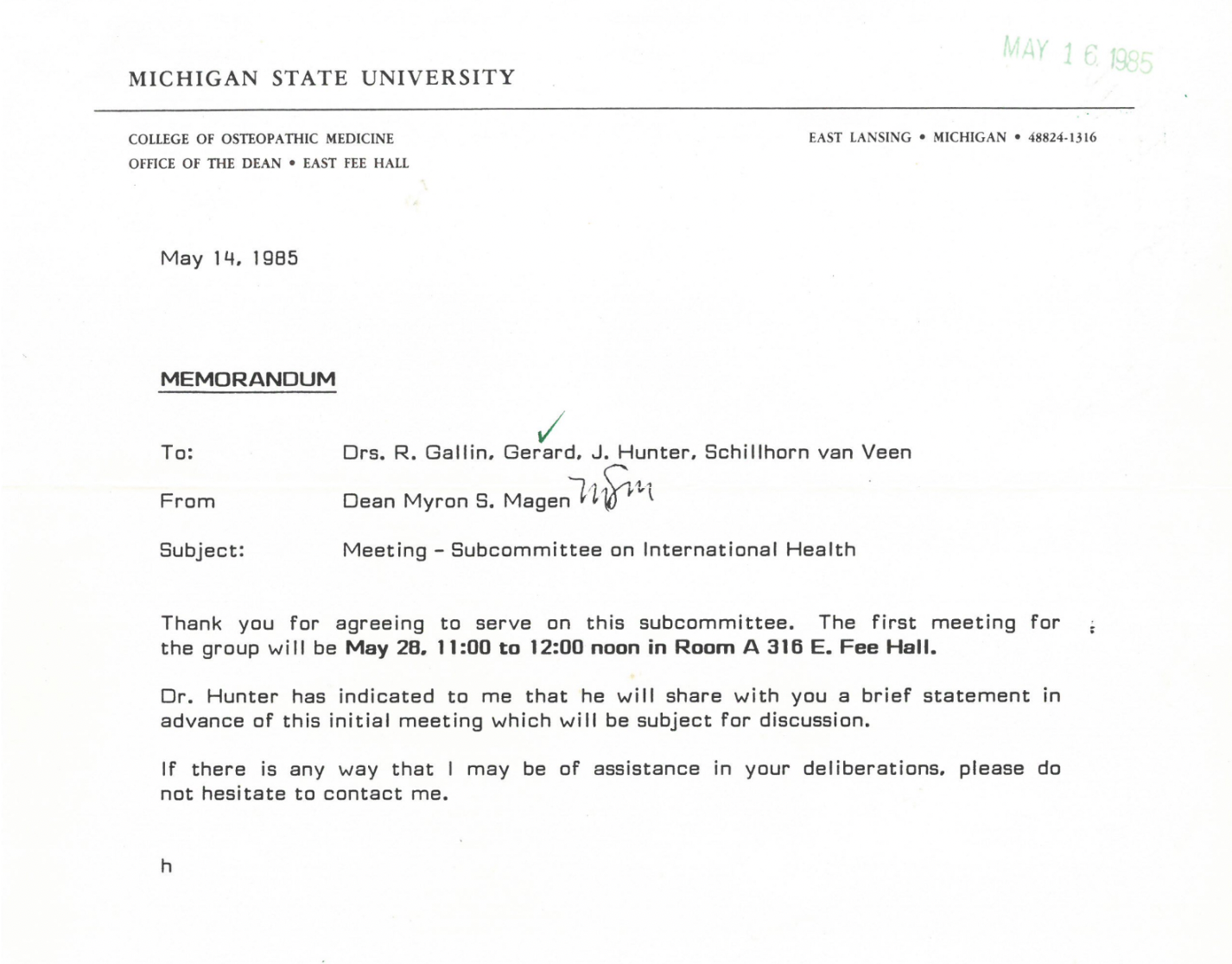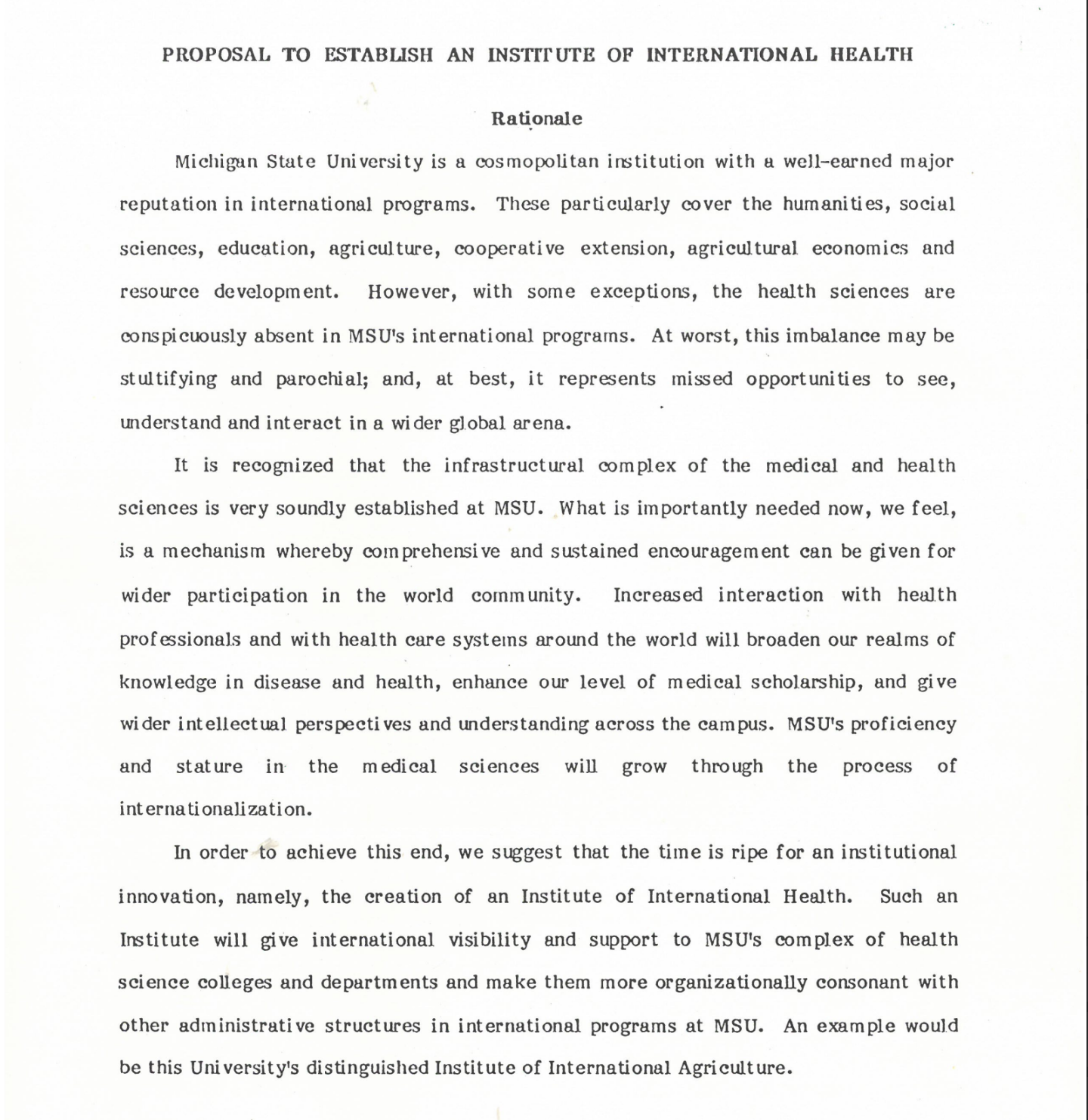History of IGH
1985 - 1999
On May 28th and June 04th of 1985, The subcommittee on International Health met to refine and endorse a proposal for the development of an Institute of International Health at MSU.
On Monday, August 12, 1985 the IIH subcommittee, chaired by Roy Gerard, M.D., held a meeting to discuss the structure of the proposed IIH. The meeting was attended by:
- Dr. Roy Gerard, M.D (CHM), Chairperson of the committee
- Dr. Schillhorn Van Veen (CVM)
- Dr. John Hunter (COM)
- Dr. Rita S. Gallin (CON)
- Dr. Herbert L. Whittier (CHM)
The total cost for the first year of operation was estimated to be approximately $256,620.

In July 1986, Michigan State University approved the establishment of an Institute of International Health. The Institute was established to serve as the focal point at MSU for faculty research and academic interests in international health. It would serve student interests. It would encourage appropriate academic growth and program development. The Institute would become a center for information and promote attention to world health problems at MSU.
In March and April of 1987, a survey instrument was designed and sent to over 4800 MSU faculty and staff to ascertain interest and experience in international health. This initial survey identified over 250 individuals with interests in international health. The information received was entered into a database.
The Institute of International Health (IIH) was established at Michigan State University (MSU) in January 1987 to marshal university resources to address problems of world health by: Promoting faculty and student research and academic interest in international- health, through scholarly activities such as seminars , conferences, workshops, forums, summer non- international- health endeavors of faculty and students; serving as a focal, coordinating point at MSU for visiting international-health scientist and students; securing external funding for collaborative international- health projects between MSU and institutions in overseas countries; serving as a center for information gathering, exchange and dissemination on world health problems.
This mission of IIH was modified in late 1995 with the consent of the Provost, to allow the Institute to concentrate primarily on externally funded projects. The new mission, implemented until 2014, allowed the IIH to focus on: The implementation and administration of extant grants; Grant seeking/proposal writing collaborative international- health projects; networking with overseas institutions and funding agencies, only as needed for new project development; Externally- paid preceptorship and workshop training for foreign scientists; The publication of the IIH Newsletter.

Pioneer Leaders
In 1987, Dr. Roy J. Gerard, founder and Chairman of the Department of Family Practice and Director of the Kellogg International Fellowship Program in Health, and Dr. Herbert L. Whittier, Associate Director of the Kellogg International Fellowship Program in Health, became interim director and associate director respectively of the Institute, on a part-time basis. In October 1988, Dr. Evangelos A. Petropoulos became director of the Institute, under a full-time, annual temporary appointment. Dr. Whittier continued as associate director, initially under a part-time and then a full time, annual , temporary appointment.
Constituency of IIH
The Institute received policy guidance from a council of the deans of the six involved units. The council of deans includes Dean W. Donald Weston, College of Human Medicine (CHM); Dean Myron Magen, College of Osteopathic Medicine (COM); Dean Gladys Courtney, College of Nursing (CON); Dean John Tasker, College of Veterinary Medicine (CVM); Dean Gwen Andrew, College of Social Science (CSS); AND Dean Ralph H. Smukler, International Studies and Programs (ISP).
The IIH also had an advisory council with representatives from each of the supporting colleges and several student representatives. The group met once a quarter and helped to inform the IIH Director of concerns in their respective units, and its members also advised their own college faculty concerning IIH activities and opportunities. The advisors included: Dr. Roy J. Gerard, CHM; Dr. Walter Mill, COM; Ms. Joanne Pohl, CON; Dr. Jeffrey Williams, CVM; Dr. Judy Pugh, CSS; Dr. David Wiley, ISP; student representatives are Ms. Julie Johnson (COM- IHP) and Mr. Mark Dixon (CHM-IHP) and Ms. Kati Loeffler, CVM-IVSPG.
The College of Osteopathic Medicine was established as IIH Lead College.
The colleges mentioned above contributed general funds for the IIH’s operation, and also faculty and staff who provide the content for the Institute’s projects and programs overseas. In addition, the IIH had access to faculty from the other ten MSU colleges for the Institute’s projects and programs, as need for expertise in a particular discipline was arising in the broader field of international health. Collaboration with these units enhanced the IIH’s ability to approach world health problems from a multidisciplinary perspective, that was increasingly required by funding agencies, and necessary for addressing today’s international-health problems. In turn, the IIH provided, from its external grants, salary-release dollars for faculty in various MSU departments, who contribute the content for the IIH’s international programs. Over those early years, salary-release funds consistently exceeded the contributions from the individual colleges to IIH. The IIH also received substantial funding from the Office of the Provost.
IIH first funded projects
- Prevention and treatment of cardiovascular diseases in Bulgaria,
- Molecular methodology for vaccine development against Schistosomiasis in Egypt,
- Participant training in hospital management for two Tanzanian physicians,
- Workshop on Tropical Diseases,
- Training in Medical Informatics in Sub- Saharan African Countries,
- Environmental Sciences in Japan,
- Kellogg International Fellowship Program in Health, (29 fellows in 18 countries).
- Medical Trainer College Japan.
The hallmark of these IIH projects was their multidisciplinary nature: typically, no less than four colleges and seven faculty from these colleges were involved in each project. Multidisciplinary research on international-health issues and effective outreach to communities abroad and in Michigan were central to the mission of the IIH.
One Connection The Newsletter
On November 10, 1987 the first draft of IIH NEWSLETTER was composed. Each member of the IIH Advisory Committee was asked to write a section on international health activities in his/her college; the information was incorporated in the first draft. The final draft was letter reviewed in the Advisory Committee Meeting of November 13th, 1987. The final draft was delivered by November 20th and produced on December 01st, 1987.
From 1988 to 2001, 13 years of uninterrupted bimonthly publication bringing news about the IIH’s projects and activities, as well as other international-health news to a large constituency on the MSU campus, other Michigan and U.S. institutions, funding agencies in Washington, and overseas institutions. Its initial circulation was over 1.000 copies. In the words of an NIH office in 2001:
“The fact that your newsletter has been arriving regularly and without interruption for many years, that it is highly informative and consistent in format and editorial quality, conveys an image of seriousness, efficiency and stability about your Institute.”
The Newsletter has now had 32 years of publication.
Nowadays the newsletter is also published electronically, on a yearly basis, on the IGH website.

2000 - Present
In 2000, an internal review committee (IRC), composed of representatives from the six constituent colleges supporting the Institute for International Health (IIH), was asked “to review the accomplishments of IIH over the last five years, and to consider future possibilities and a new mandate for the Institute.”
The committee by then recommended that IIH was reconfigured so that its primary goals were:
- To encourage and support new initiatives in international health
- To serve as the office coordinating overseas elective experiences for students in the health professions
The committee also recommended that IIH Director should be an individual with strong medical credentials capable of:
- Encouraging new ventures in international health on campus and
- Supporting the international environmental health activities of IIH
By 2006, the main activity within IIH was an environmental health project. There was no director or leadership for the unit. By then the unit was staffed with one full-time and one part-time administrative assistant. The Institute had one continuing grant, the Training and Research in Environmental Health in the Balkans (TREHB) program, that concluded by the end of 2018 (22 years!), and the College of Osteopathic Medicine had an on-going relationship with the Medical Trainers College in Japan. Every summer, Japanese students came from the Medical Trainers College in Japan to the COM for two weeks to participate in a short course on basic principles of osteopathic manipulative medicine. The TREHB program was in its second funding cycle (through 2006) as a program developed and implemented within the Institute of International Health and funded through a grant from the National Institutes of Health’s Fogarty International Center. The program, which began in September 1996, was a multidisciplinary, collaborative effort to learn more about environmental and occupational health issues initially in Bulgaria, but in the second funding cycle, also in Romania and Yugoslavia, and assisted with research and training in these fields for Balkan nationals.
With the “Boldness by Design” initiative and the identification of the “expansion of international reach” as a strategic imperative of the university, the interest in reconfiguring IIH began.
In 2009, Dr. Reza Nassiri was appointed as new IIH director. Dr. Nasssiri contributed to the Institute for Global Health from 2009 to 2015.
In 2011 a new mission statement started considering the global outreach that IIH was taking. The mission of the Institute for International Health (IIH) was then, to foster and enhance the opportunities for faculty and students to create, innovate, and transform international transdisciplinary health research, health development projects, and academic interest in global health, and thus, advance the vision of Michigan State University.
The Institute of International Health at MSU, in the spirit of the first land-grant university, had (and continues to sustain) a deep commitment to improving the quality of life in resource-poor and disadvantaged communities around the world. The institute opened between 2009 and 2016, the door to the world through the following global programs for undergraduate, pre-professional students and graduate students in medicine, nursing and veterinary medicine.
Annual Study Abroad Programs
- Belem, Brazil
- Havana, Cuba
- Santo Domingo, Dominican Republic
- Tecpan, Guatemala
- Seoul, Republic of Korea
- Blantyre, Malawi
- Merida, Mexico
- Iquitos, Peru
- Istanbul & Konya, Turkey
Independent Clerkship Rotations
- Approved Rotations in 56 countries for medical residents between 2012 and 2016.
Global-Health Training Programs
- China
- Japan
- Republic of Korea
During 2017, encouragement to find external public and private sources of support to initiate and sustain programs on the health field led current director and Associate Dean for Global Health in the College of Osteopathic Medicine, William C. Cunningham, to develop an international curriculum revised five-year contract with Armed Forces College of Medicine in Egypt, reaffirming the rationale of why Michigan State University proposed an Institute of International Health: “… maintaining a network of linkages in international health with: a) individual health professionals working abroad, b) hospitals and public health departments abroad and c) foreign schools and universities, and “…help health professionals to learn new techniques and skills, study and write”.
Global became local. On September 20th, 2017 the Advisory Board Committee approved the change of the name. Institute for International Health got globalized and changed to Institute for Global Health, reflecting the increased interaction with health professionals and with healthcare systems around the world.
IGH currently has funded research projects in ten countries on four continents.
IGH hosts faculty and students from many countries to deliver continuing health education seminars. Students and faculty from Egypt, South Korea, China, Peru, Japan, Dominican Republic, Cuba, Guatemala and other countries are frequent enrollees in these courses.
During 2018 and 2019, the team grew from four to sixteen members including a Director, Associate Directors, researchers, and staff that support daily activities and long-term projects. Currently, ten faculty adjuncts are appointed to contribute with IGH endeavors locally and internationally.
In 2019, the newIGH mission statement was released, presenting the concepts of capacity building and global partners as contributors.
There is a critical global need for a new One World, One Health, One Medicine concept that will bridge the divide between humans, veterinary medicine, food security systems and environmental challenges. With the concept of preparing the Institute to be a center for information and promoting attention to world health problems at MSU, Education and Research Consortium of the Americas (ERCA), was established in 2019. By laws were created in the beginning of 2020. Six institutions from Latin America and South America, whom IGH has partnered with for the past decade, joined this Consortium in the collaborative effort to develop global education, research and capacity building. The results of the annual research conference were the establishment of four online Virtual Institutes for continuing to partner in education and research. Research partners decided upon the four Virtual Institutes: Psychosocial Determinants of Health, Tropical Medicine/Infectious Diseases, Water Quality/Waste Management and the Ecology and Human Well-being Institute.
Amid the global SARS COV-19 pandemic, one of the virtual institutes has focused on a water virology research project. During the first virtual meeting of the Water Quality Institute on June 25th, Dr. Xagoraraki in the College of Engineering presented research to identify COVID-19 and other viruses utilizing wastewater sampling in urban and rural areas. The goal: To predict the next outbreak of viral illness and hopefully prevent another deadly epidemic/pandemic. The proposal was selected in 2021 as one of the potential projects MSU will fund through the Strategic Partnership Grant (SPG), the largest grant funded by MSU.
Continuing with the founder’s ideas of elevating the quality of our programs at MSU, the development of a Master of Science in Global Health started in 2016. The evaluation of the program took about three years, focusing on the curriculum, the faculty, the staff and defining if “online” was the best way to present it to the interest community. During the beginning of 2019, the enrollment for the online master’s program as well as the online certificate program started. The next step was the commencement of classes for the Certificate in Global Health during Spring of 2020, and in Summer 2020, for the Master’s in Global Health. By the end of 2020, the first graduate certificate student graduated and another two students were expected to finish their masters programs by Summer 2021. Currently over 20 students have graduated from the Master of Science in Global Health.
IGH continues to flourish as MSU’s focal point of international health by expanding training programs on the MSU campus, study abroad programs, and collaborative partnerships around the world.